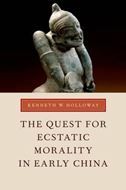The Quest for Ecstatic Morality in Early China
Publisher:
Oxford University Press USA
Publication:
4/2013
Languages:
English
Binding:
Paperback
ISBN/SKU:
9780199941742
Pages:
192
Sizes:
235 x 156mm
Weight:
0.2420
On OrderTo be dispatched within 1 week
£17.99
£17.99
(€20.15)
There is an intense love of freedom evident in the 'Xing zi mingchu,' a text last seen when it was buried in a Chinese tomb in 300 B.C.E. It tells us that both joy and sadness are the ecstatic zenith of what the text terms 'qing.' Combining emotions into qing allows them to serve as a stepping stone to the Dao, the transcendent source of morality for the world. There is a process one must follow to prepare qing: it must be beautified by learning from the classics written by ancient sages. What is absent from the process is any indication that the emotions themselves need to be suppressed or regulated, as is found in most other texts from this time.
The Confucian principles of humanity and righteousness are not rejected, but they are seen as needing our qing and the Dao. Holloway argues that the Dao here is the same Dao of Laozi's Daode jing. As a missing link between what came to be called Confucianism and Daoism, the 'Xing zi mingchu' is changing the way we look at the history of religion in early China.
Readership: Scholars and readers interested in the Daode jing and Laozi; graduate and upper-level undergraduate students working on early modern China or religion in China more generally.
The Confucian principles of humanity and righteousness are not rejected, but they are seen as needing our qing and the Dao. Holloway argues that the Dao here is the same Dao of Laozi's Daode jing. As a missing link between what came to be called Confucianism and Daoism, the 'Xing zi mingchu' is changing the way we look at the history of religion in early China.
Readership: Scholars and readers interested in the Daode jing and Laozi; graduate and upper-level undergraduate students working on early modern China or religion in China more generally.




